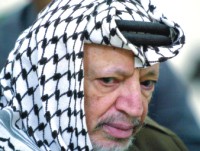Opinion
The
Promise of Jerusalem
Srabonti
Narmeen Ali
 There
was chaos in Ramallah the Friday morning of Yasser Arafat's
funeral. The helicopter door transporting the body of the
PLO leader back to his rightful home opened and closed several
times due to the havoc surrounding it. Security forces fired
gunshots in the air as warnings. When the coffin finally came
out, thousands of Arafat-followers crowded around, trying
to touch the coffin and carry it -- to pay one last respect
to the leader that fought tooth and nail, no-holds-barred,
for the recognition of their unfulfilled dream, Palestine. There
was chaos in Ramallah the Friday morning of Yasser Arafat's
funeral. The helicopter door transporting the body of the
PLO leader back to his rightful home opened and closed several
times due to the havoc surrounding it. Security forces fired
gunshots in the air as warnings. When the coffin finally came
out, thousands of Arafat-followers crowded around, trying
to touch the coffin and carry it -- to pay one last respect
to the leader that fought tooth and nail, no-holds-barred,
for the recognition of their unfulfilled dream, Palestine.
His wish
was to be buried in a Jerusalem which would be the capital
of Palestine. Instead, he was temporarily laid to rest in
his compound in Ramallah. Palestinians still hope to carry
their leader to his desired gravesite someday.
Over
the decades we have seen many faces of Arafat through the
world's eyes. We have seen the man who, to some, was a self-proclaimed
guerrilla warrior, while to others he was nothing more than
another Arab terrorist. We have seen him as the Nobel Peace
Prize laureate (shared by Yitzhak Rabin and Shimon Peres),
who then, six years later in September of 2000, walked away
from peace talks with Rabin at Camp David. We have seen him
as a man responsible for violence -- one who motivated his
people to fight guns and bombs with sticks and stones. We
have seen him as a charismatic leader who led an entire population
through a revolution, which is now known as Intifada.
We have seen his stubbornness, his will, his strength and
his inability and refusal to compromise on anything that might
endanger the idea of what he thought was right. A man with
a mission, dedicated to his cause and nothing else. The 'lone
soldier', so to speak, who spent the last few years of his
life imprisoned in his home in Ramallah, while his wife Suha
and nine-year-old daughter Zahwa live a cushy life in Paris,
away from the struggle that their husband and father fought
to the death.
Forty
years -- that's how long this man fought. Forty years of demanding
recognition and rebirth. Forty years, and still now there
is no change, no progress, no hope to fulfil that frayed dream
that Yasser Arafat so carefully painted out for his people.
Forty years and now no one knows who will lead the Palestinian
people to a victory that even now seems so distant and beyond
reach. Forty years and President George Bush is left playing
word games and stumbling through his false promises about
dedicating his second term at the White House to the formation
of Palestine. Forty years and Prime Minister Ariel Sharon
is now ready to negotiate peace talks with Palestinian authorities,
claiming that "recent events" -- Arafat's death
apparently being the main one -- "are likely to constitute
a turning point in Middle Eastern history."
One has
to wonder what Arafat was thinking during his last days. Did
he wonder whether it was all worth it -- to spend over half
his lifetime for something that he never lived to see? Did
he have any regrets or anything that he would have done differently?
Did he die peacefully, knowing that his fight would be carried
on? Or did he worry that the struggle that he put his whole
heart and soul into would be a forgotten dream?
There
is always confusion about people who tend to wreak havoc,
cause upheaval, force change whether it's needed or not. To
some people they are dangerous, barbaric terrorists, and to
others they are unnecessary trouble-makers who want attention.
Yet, to a significant amount of people, they are heroes, icons,
revolutionaries. They are the people who sacrifice their entire
existences for a cause. They are the people that never give
up, never bend and never break. Yasser Arafat was such a person.
And although his death has caused total confusion and as a
result, no one is sure what the future of the Middle East
or Palestine will be, one has to hope that, in due time, his
dream will become a promise of the future.
Copyright
(R) thedailystar.net 2004
|
| |
